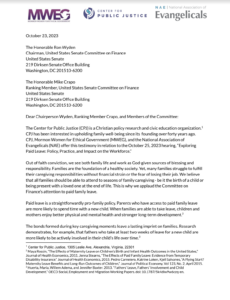The Center for Public Justice (CPJ) is a Christian policy research and civic education organization. CPJ has been interested in upholding family well-being since its founding over forty years ago. CPJ, Mormon Women for Ethical Government (MWEG), and the National Association of Evangelicals (NAE) offer this testimony in relation to the October 25, 2023 hearing, “Exploring Paid Leave: Policy, Practice, and Impact on the Workforce.”
Out of faith conviction, we see both family life and work as God-given sources of blessing and responsibility. Families are the foundation of a healthy society. Yet, many families struggle to fulfill their caregiving responsibilities without financial strain or the fear of losing their job. We believe that all families should be able to attend to seasons of family caregiving – be it the birth of a child or being present with a loved one at the end of life. This is why we applaud the Committee on Finance’s attention to paid family leave.
Paid leave is a straightforwardly pro-family policy. Parents who have access to paid family leave are more likely to spend time with a new child. When families are able to take leave, children and mothers enjoy better physical and mental health and stronger long-term development.
The bonds formed during key caregiving moments leave a lasting imprint on families. Research demonstrates, for example, that fathers who take at least two weeks of leave for a new child are more likely to be actively involved in their child’s life over time.
Only 27% of the workforce currently has access to paid family leave. Younger and lower wage workers – the very Americans who face the greatest financial precarity before and after welcoming a new child – are those least likely to have paid family leave or other basic benefits that support family care.
The Center for Public Justice, in partnership with the Center for Integrity in Business, interviewed faith-based employers about their attitudes and practices relative to paid family leave. Family values were overwhelmingly important to these employers. At the same time, expanding paid family leave policies on an employer-by-employer basis posed real challenges. Well-crafted public policy could help employers better match their workplace practices with their core values by making paid family leave an accessible benefit for all.
In order for the government to uphold a just society, it must play a role in promoting a basic framework in which families can thrive. We encourage this Committee to continue to work toward paid family leave solutions that address the circumstances of small employers – including those in the nonprofit and religious sectors – while also protecting vital time for family caregiving. Thank you for your leadership and support of our nation’s families.

